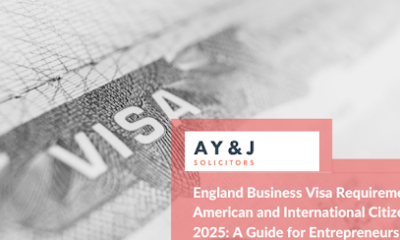LAW
The Essential Role of Lawyers in Child Custody Disputes

Importance of Legal Representation
Navigating the complexities of child custody conflicts requires a sharp understanding of legal processes. Without adequate direction, people might feel overwhelmed by the red tape. This is the point at which legal counsel becomes essential. A knowledgeable lawyer can safeguard the rights of parents and children throughout the often tumultuous legal process. For instance, in cases like child custody Red Bank, NJ, it is vital to have a legal expert who comprehends the local laws and the nuances of your specific case.
Attorneys provide more than solely legal knowledge; they play a crucial role in crafting a tactical plan that influences the entire direction of the custody conflict. In a terrain marked by intricate paperwork, rapidly changing law and emotional tension, the lawyer’s role as a navigator can significantly increase the likelihood of achieving a favorable outcome for both the parent and the child involved. Often, their involvement can be the pivotal factor between winning and losing, providing clarity and direction where there usually seems to be none.
Key Tasks of Child Custody Lawyers
Child custody lawyers wear many hats during custody disputes. Their primary function is to advocate on the client’s behalf, ensuring that all necessary legal processes are adhered to correctly and efficiently. From filing the initial pleadings and responses to presenting the case in court, lawyers partake in every stage with meticulous attention to detail. Additionally, they conduct discovery, gathering all pertinent information, which can be pivotal in presenting a case that favors their client’s interests.
Legal representation adeptly addresses acute challenges, such as compliance with deadlines and proper documentation—areas rife with potential pitfalls for those unfamiliar with the legal system. By entrusting these critical tasks to a seasoned legal expert, parents can focus on personal and familial matters, confident that their lawyer is steering the legal journey with precision and care.
Role in Mediation and Negotiation
When court proceedings can be avoided, child custody lawyers often guide clients through more amicable processes, such as mediation or negotiation. This form of dispute resolution allows parents to maintain greater control over the outcome, helping to foster cooperation rather than adversarial confrontation. Many cases are resolved in this phase, as it enables both parties to articulate their interests and preferences with the facilitated guidance of their legal representatives, leading to mutually beneficial solutions.
During mediation, a lawyer acts not only as a legal advisor but also as a buffer. They help elucidate client positions and bring nuanced understanding to the table, often framing options in a manner that can lead to consensus. Mediation is a viable alternative, usually leading to faster and more cost-effective resolutions, a direction encouraged by various custody experts. These discussions typically provide a constructive platform for conflict resolution, which can help preserve familial relationships after divorce.
Understanding the Legal Framework
The labyrinthine web of child custody laws necessitates expert navigation. Laws vary widely by jurisdiction; understanding them is critical for anyone involved in custody disputes. Lawyers with specialized knowledge in family law interpret these laws, advising clients on relevant legal criteria, such as joint, sole, or shared custody. As highlighted by the American Psychological Association, custody decisions are increasingly influenced by psychological research, particularly regarding the impact of different custody arrangements on child well-being. They work diligently to stay up-to-date with legislative updates and apply this knowledge in their strategies to support their clients’ goals.
Notably, child custody decisions prioritize the child’s welfare above all else. Expert lawyers understand how to substantiate claims in line with these legal standards and work diligently to present cases, drawing on a nuanced understanding of cases in both local and broader contexts.
Selecting the Right Legal Counsel
Choosing a skilled lawyer is crucial to effectively navigating the complexities of a child custody case. Seek legal experts with a demonstrated history of managing comparable cases and expressing themselves clearly and transparently. A lawyer’s reputation and past successes in analogous cases can offer significant insight into what one might expect. Beyond professional credentials, the lawyer-client relationship should be grounded in mutual trust and commitment.
Embarking on this journey without transparency can lead to misaligned objectives and decisions under duress. Potential clients should feel empowered and obliged to ask probing questions, ensuring their chosen lawyer aligns closely with their personal and legal aims. This alignment is crucial in reaching a resolution that serves all parties best interests, especially the children.
Providing Emotional Support During Proceedings
Beyond legal advocacy, lawyers serve as a stabilizing force during emotionally taxing custody disputes. The emotional toll of these battles often weighs heavily on parents and families, but having an empathetic attorney by one’s side provides solace and guidance. Lawyers help manage expectations and support clients emotionally, offering reassurance during emotionally charged proceedings.
Feeling supported during such stressful times reduces anxiety, allowing parents to remain focused on the long-term welfare of their child. This holistic approach highlights the importance of having a well-rounded advocate in child custody disputes, one who combines legal expertise with emotional sensitivity. By doing this, they guarantee that parents possess the strength to manage the challenges of custody disputes.
LAW
How to Notarize Documents at Home
Understanding Remote Online Notarization (RON)
Recent technological advancements have made it easier to complete legal and business paperwork without stepping outside your home. Among the most convenient innovations is Remote Online Notarization (RON), which enables you to connect with a commissioned notary online to notarize your documents legally. This digital process is secure, efficient, and legally recognized in many areas, eliminating the complications of scheduling an in-person notary visit or finding a local office. For residents in some states, resources like notary public study guide New York can help clarify state-specific guidelines and procedures for remote notarization.
During a RON session, an online notary utilizes secure audio-visual technology to verify your identity, witness your signature, and affix a digital notarial seal. The session is typically recorded and archived, providing an added layer of authenticity and protection for your important records. This method is especially attractive for professionals and families seeking greater flexibility in managing paperwork.
As more states embrace online notarization, individuals must understand the nuances and benefits of RON before engaging with a service. Since processes may vary depending on local law and the type of document being notarized, being well-informed helps prevent delays and ensures documents are legally binding.
With online notarization, you maintain control over your time while gaining access to a streamlined, legally compliant solution. The reliability and security of virtual platforms continue to expand, making it a practical option for anyone who needs legally notarized documents without traditional limitations.
Legal Status of RON Across the United States
Remote Online Notarization has led to widespread adoption in numerous states, although legislation and regulatory standards differ across jurisdictions. For example, Illinois’ E-Notary system allows residents to notarize their documents from anywhere, and similar systems are expected to become even more prevalent in other states by 2025. However, you should verify state-specific requirements to ensure your notarization will be recognized, as some states mandate in-person identification for certain documents or limit the types of documents eligible for remote notarization.
Regulators are continually updating laws to balance innovation with security and fraud prevention. To confirm the legitimacy of an online notarization, consult your state’s Secretary of State website or browse resources like the National Association of Secretaries of State for recent developments in digital legal procedures.

Steps to Notarize Documents at Home
- Choose a Reliable Online Notary Service: Evaluate platforms to ensure they are officially recognized in your state and employ only commissioned notaries. The platform should be secure, easy to use, and maintain a transparent process.
- Prepare Your Document: Before starting, make sure all necessary details are complete, as incomplete paperwork may cause delays or be rejected.
- Verify Your Identity: Before the session, you may be required to upload a picture of your identification (e.g., state ID or passport) or answer knowledge-based authentication questions.
- Attend the Virtual Notarization Session: Join a live video call with the notary. The notary will observe your signature and apply their electronic notarial seal, while the session is usually recorded for authentication.
- Receive the Notarized Document: After completion, you’ll get a digitally notarized document, which you can save, share, or print as needed.
Benefits of Notarizing Documents at Home
- Convenience: The entire notarization process, from verification to receipt, can be handled from your device, eliminating travel and waiting times.
- Speed: Many virtual notary services promise turnaround in under 15 minutes, allowing urgent documents to be handled expeditiously.
- Security: RON platforms typically use state-of-the-art encryption, digital session recordings, and careful ID verification, providing robust protection against fraud and unauthorized access.
Modern online notary platforms also provide secure document storage and retrieval, making it easy to manage your notarized paperwork whenever needed.
Common Documents Suitable for RON
A growing array of documents can be legally notarized online, providing wide utility for business and personal matters. These include:
- Real estate closing paperwork and mortgage documents
- Power of attorney forms
- Affidavits, sworn statements, and acknowledgments
- Parental consent or travel authorization forms
- Contracts and commercial agreements
It’s important to note that, according to current law, some paperwork—especially those issued by government agencies, like birth certificates or certain international documents—still typically requires in-person notarization for verification and acceptance.
Choosing a Reliable Online Notary Service
Selecting a reputable online notarization platform greatly affects your documents’ security and legal soundness. Always confirm that your chosen provider operates under your state’s legal framework and employs properly commissioned notaries.
Key Considerations When Choosing a Platform
- Legal Compliance: The platform must be authorized to operate in your jurisdiction and have clear proof of compliance and regulatory oversight.
- Security Features: Prioritize services that offer end-to-end encryption and rigorous privacy policies, protecting your sensitive data throughout the process.
- User Support and Ease of Use: The best providers simplify each step, with clear instructions, responsive support, and helpful tutorials.
Compare reviews and features to make an informed decision, and always double-check the latest legal requirements before beginning.
Final Thoughts
Remote online notarization has transformed how individuals and businesses manage legal documentation, offering unprecedented convenience, speed, and security. By becoming familiar with your state’s RON laws, choosing a trustworthy service, and preparing your documents in advance, you can notarize essential paperwork easily and confidently—from anywhere.
LAW
How Bail Bonds Assist Individuals Navigating the Justice System
Bail bonds are a cornerstone of the American criminal justice system, providing a practical means for individuals to secure their release from custody while awaiting trial. This system is built on the presumption of innocence, allowing defendants to prepare for court and continue daily responsibilities. For those unable to pay the full bail amount, working with a licensed bondsman provides critical support, enabling release from jail in exchange for a fee. By exploring options like surety bail bonds Wharton, families and defendants can better navigate challenging circumstances, remain with their loved ones, and address charges in the community instead of from behind bars.
The bail bond process does more than ensure appearance in court—it helps individuals maintain family unity, employment, and access to essential resources during one of the most stressful periods of their lives. The system’s structure, however, is complex and evolving. Understanding bail bonds, how they work, and their wide-reaching impacts on individuals and communities is essential for anyone encountering the justice system.
Understanding Bail Bonds
Upon arrest, a court may assign a bail amount that serves as a safeguard, ensuring the defendant will appear for all required court proceedings. Bail is a financial sum set by the judge, informed by the severity of the alleged offense and the defendant’s perceived risk of flight. When the full bail sum exceeds personal or family resources, bail bondsmen step in to offer a surety bond, essentially pledging the bail amount to the court on the defendant’s behalf in exchange for a fee or premium. According to Investopedia, bail bonds serve as a practical solution for many who cannot afford to pay the full amount upfront, providing access to pretrial release while still ensuring accountability.
The surety acts as a financial guarantee to the court, promoting accountability while granting pretrial freedom. This vital process supports not only individuals but also the overall efficiency and accessibility of the judicial system.
The Process of Obtaining a Bail Bond
Obtaining a bail bond involves several deliberate steps designed to safeguard the interests of the defendant, the court, and the bail bondsman:
- Contact a Licensed Bail Bondsman: Either the accused or a representative reaches out to a reputable, licensed professional who operates within the legal frameworks of their state.
- Sign an Agreement and Pay the Premium: An agreement is drawn up, typically requiring a non-refundable payment equal to about 10% of the total bail. Collateral might be necessary, such as property or valuables, depending on the risk and amount involved.
- Bail Bondsman Posts the Bond: The bondsman delivers the surety bond to the court, ensuring the defendant is released from custody.
- Compliance with Court Orders: The defendant must adhere to all court stipulations; if they fail to appear, the bondsman may seek reimbursement from the collateral or employ recovery agents to secure the defendant’s return.
Financial Implications of Bail Bonds
Bail bonds offer immediate freedom but come with ongoing obligations. The 10% premium paid to the bondsman is non-refundable, regardless of the case’s result. Should a defendant fail to appear in court, the bondsman is at risk of forfeiting the full bail sum to the court and may seek repayment from the defendant or their cosigner, often by claiming the pledged collateral.
The financial stress is significant—many families resort to borrowing or liquidating assets to meet collateral demands, and repeated interactions with the bail system can trap poorer households in cycles of debt or loss.
Bail Bonds and Community Impact
The effects of the bail system extend beyond individual defendants, often disproportionately impacting communities of color and low-income families. Cash bail’s widespread use has fueled higher rates of pretrial detention in marginalized populations, with many held not because they pose a flight risk or danger, but due to their inability to pay. As highlighted by research on pretrial practices at NIJ, this cycle exacerbates social and economic inequality, leading to job loss, unstable housing, and increased family strain.
This broader impact demonstrates how bail policies can perpetuate cycles of disadvantage across generations. Addressing these systemic issues requires reforms that balance public safety with fairness and equity in the justice system.
Recent Reforms in the Bail System
Growing awareness of the problems inherent in cash bail has spurred reforms in states such as Illinois and New York. Illinois recently became the first state in the U.S. to abolish cash bail entirely, meaning individuals can no longer be held solely because they are unable to pay. New York’s legislative efforts have scaled back cash bail for most non-violent offenses, aiming to reduce unjust pretrial incarceration. Other jurisdictions are exploring similar reforms that prioritize individual risk assessments over financial sureties.
Alternatives to Traditional Bail Bonds
Alternatives have arisen to counter the limitations and inequities of the cash bail model. Standard options now include:
- Pretrial Services Programs: These government- or nonprofit-led initiatives supervise defendants and provide social support, helping ensure court appearances without imposing a financial burden.
- Community Bail Funds: Charitable organizations, such as the Chicago Community Bond Fund, raise donations to cover bail for those who cannot afford it, thereby reducing jail populations and promoting systemic fairness.
Such alternatives prove particularly important in communities hit hardest by the traditional bail process, as they reduce incarceration rates and related social harms.
The Role of Bail Bondsmen
Bail bondsmen play an intermediary role within the justice system. They facilitate pretrial release, accept responsibility for the whole bail sum, and ensure their clients return to court as scheduled. Bondsmen are legally empowered to track down and recover clients who violate the terms of their release. Their work is essential within the current system, though mounting criticism highlights the need for better oversight and potential alternatives to profit-driven models.
Conclusion
Bail bonds are a vital resource for countless families facing the uncertainty of criminal charges. They uphold the right to freedom before a trial, help defendants maintain community ties, and ensure cases proceed efficiently. Nonetheless, significant financial and social burdens persist, making ongoing reform and the emergence of alternatives both necessary and urgent for advancing fairness in the American justice system.
LAW
Diversifying Paths to Legal Careers: Opportunities Beyond the Courtroom

The Changing Landscape of Legal Careers
For years, many have associated legal careers with high-pressure litigation, dramatic courtrooms, and mountains of paperwork. While this stereotype still has some merit in the traditional legal world, the reality is that legal careers now offer much more variety than ever before. Whether you’re a recent graduate, a seasoned attorney, or someone considering law school, there are more pathways than ever to apply your legal training in innovative and meaningful ways. A wealth of opportunities now exists in corporate environments, technology companies, policy think tanks, and beyond. A quick visit to Sloanlawkc.com highlights just how interconnected legal skills are with industries outside of the courtroom. The legal profession is evolving rapidly due to tighter regulations and shifting societal expectations. Legal professionals can now take on hybrid roles that integrate compliance, risk management, policy interpretation, and strategic business planning. These multifaceted positions allow them to make tangible impacts across sectors, such as leading diversity initiatives or serving as privacy consultants. This diversity of options makes the legal profession more adaptive, diverse, and resilient.
What Drives Professionals Away from Tradition?
The legal profession increasingly embraces non-traditional paths due to work-life balance, social change, and proactive roles. As many as one-third of law graduates now work outside traditional law practice, supporting companies in regulatory matters, guiding product development, and driving organizational decision-making. These non-traditional roles are now considered viable, respected career options, reflecting broader workforce trends. Legal professionals lead cross-departmental teams and act as multinational corporations’ chief compliance or ethics officers. They are at the forefront of developing legal technology platforms that improve access to justice and simplify legal processes.
Top Alternative Careers for Legal Professionals
Legal professionals are crucial in various alternative careers, including compliance and risk management, legal technology, mediation and arbitration, policy and advocacy work, and academic and legal education. Compliance and risk management roles involve analyzing new laws, mitigating exposure, and communicating risk to executives. Legal technologists design and implement software tools for law firms and startups, while mediation and arbitration involve resolving legal disputes through empathy, objectivity, and creative problem-solving. Legal professionals also contribute to policy development and advocacy work, crafting legislation and leading campaigns that impact the legal landscape.
Essential Skills: What Transfers Outside Courtrooms?
Legal skills, such as analytical reasoning, research, and persuasive writing, are essential in various industries, such as consulting, finance, healthcare administration, human resources, and entrepreneurship. They guide contract negotiations and marketing strategies. Legal occupations are expected to grow as companies focus on ethical standards and seek expert guidance. Soft skills, such as synthesizing complex information, adapting messaging, and facilitating consensus, are also crucial. Strong legal professionals listen actively, anticipate risk, and communicate assertively.
Emerging Role of Technology in Legal Work
Technology is transforming law practice, document review, e-discovery, legal research, and client communication. Cloud-based tools, AI-powered algorithms, and digital filing systems are essential for legal operations. Legal professionals who combine technical aptitude with legal knowledge are in demand for data privacy, cybersecurity, and project management roles. This transformation is not limited to large law firms but also includes solo practitioners, non-profits, and governmental agencies. Positioning oneself as knowledgeable about both law and technology expands the scope of possible roles, ensuring relevance in the digitized marketplace.
How to Broaden Your Legal Career Prospects
Stay updated on legal and industry developments by subscribing to news updates, attending conferences, and joining professional groups. Strengthen your technology skills through online learning, certifications, and industry workshops. Pursue additional certifications in niche areas like compliance, mediation, or policy analysis. Build a strong network within and outside the legal field to introduce new perspectives and find suitable positions. Engage in thought leadership by writing articles, speaking at events, or participating in webinars to increase visibility and position yourself as a trusted advisor.
-

 Entertainment10 months ago
Entertainment10 months agoEnchantment & Excitement: Crafting Unforgettable Event Experiences
-

 GENERAL1 year ago
GENERAL1 year agoFrom Fan Art to Original Works: The Diversity of doujindesu Creations
-

 GENERAL12 months ago
GENERAL12 months agoEngland Business Visa Requirements for American and International Citizens in 2025: A Guide for Entrepreneurs
-

 GENERAL10 months ago
GENERAL10 months agoCrossword Conundrum: The Significance of vault opener nyt crossword
-

 GENERAL1 year ago
GENERAL1 year agoLatest Trends in Men’s and Women’s Jackets for the Upcoming Season
-

 GENERAL10 months ago
GENERAL10 months agoExploring the World of nhentai.nef: A Comprehensive Guide for New Users
-

 Health1 year ago
Health1 year agoDiscovering gel ooru: The Ultimate Guide to This Unique Traditional Craft
-

 Entertainment10 months ago
Entertainment10 months agoExploring the World of NHentai: A Comprehensive Guide to nhentai.met
